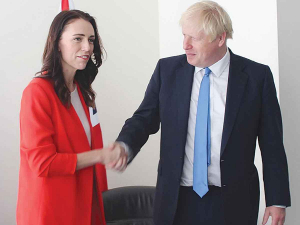India FTA timed right for NZ, says trade analyst
Leading trade analyst Stephen Jacobi has rubbished claims that New Zealand could have got a better free trade deal with India if it had prolonged the negotiations.
 Prime Minister Jacinda Ardern and British PM Boris Johnson are both keen to secure a free trade deal.
Prime Minister Jacinda Ardern and British PM Boris Johnson are both keen to secure a free trade deal.
Dairy processors say the launch of free trade agreement (FTA) negotiations between New Zealand and the UK is a positive development.
Dairy Companies of NZ (DCANZ) chairman Malcolm Bailey says a high-quality and comprehensive FTA between the United Kingdom and New Zealand will further strengthen the historic and close relationship between the two countries.
At a time when a number of countries are reverting to trade protectionist policies and subsidies, it is heartening to see like-minded countries like NZ and the UK showing leadership on trade issues, he says.
Currently, the UK is only a small market for New Zealand dairy exports, accounting for 0.08% of New Zealand’s dairy exports in 2019. This is despite the fact that the UK is one of the world’s largest importers of dairy products.
“The UK’s previous membership of the European Union (EU), one of the most protected dairy markets globally, has severely limited the opportunity for its consumers to purchase high quality NZ dairy products,” says Bailey.
“Now that the UK is able to negotiate its own trade arrangements, a UK-NZ FTA will provide important commercial opportunities for dairy sector participants in both countries.”
Bailey says the NZ and the UK dairy sectors are complementary, with counter-seasonal production systems and a shared interest in managing price volatility globally. Both countries also place a high level of importance on food safety, animal welfare and environmental outcomes.
Bailey says the UK dairy industry is also efficient, with a long-history of competing against highly subsidised dairy exports from across the EU.
“An FTA between the UK and New Zealand will ensure that unsubsidised New Zealand dairy products have the same level of market access as has been enjoyed by European dairy products over the past four decades,” he says.
Trade Minister David Parker announced the launch of the FTA talks last week, with the first round of negotiations expected to take place by video conference from mid-July.
This comes a week after the EU made a poor offer to NZ on agriculture as part of the FTA negotiations between the two jurisdictions.
Parker hailed the start of the negotiations saying that as the UK embarks on its next steps post-Brexit, NZ is pleased to be among the first countries to negotiate a trade agreement with one of our “oldest friends”.
“We look forward to an FTA that opens up more opportunities for small and medium sized businesses, Māori exporters, and our regional communities, consistent with our ‘Trade for All’ objectives,” he says.
Parker says NZ and the UK have a close relationship, including strong trade and economic ties, common values and traditions and a shared history. He says an FTA will be an important new milestone in that relationship and adds that in the post Brexit environment, it makes more sense than ever for NZ to be working together to grow this partnership for the future.
“As the global economy continues to be severely impacted by the effects of Covid-19, we are more committed than ever to concluding a bilateral FTA capable of delivering significant benefits to the people of both New Zealand and the UK,” he says.
Both sides have committed to achieving an early conclusion to a high quality, comprehensive and inclusive trade agreement, something NZ and the EU are currently struggling to do. Britain is NZ’s sixth largest trading partner with two-way trade worth almost $6 billion last year.
According to the latest Fresh Produce Trend Report from United Fresh, 2026 will be a year where fruit and vegetables are shaped by cost pressures, rapid digital adoption, and a renewed focus on wellbeing at home.
The Roar is a highlight of the game hunting calendar in New Zealand, with thousands of hunters set to head for the hills to hunt male stags during March and April.
OPINION: The past few weeks have been tough on farms across the North Island: floods and storms have caused damage and disruption to families and businesses.
European dairy giant Arla Foods celebrated its 25th anniversary as a cross-border, farmer-owned co-operative with a solid half-year result.
The sale of Fonterra’s global consumer and related businesses is expected to be completed within two months.
Fonterra is boosting its butter production capacity to meet growing demand.